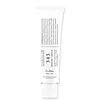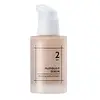What's inside
What's inside
 Key Ingredients
Key Ingredients

 Benefits
Benefits

 Concerns
Concerns

 Ingredients Side-by-side
Ingredients Side-by-side

Water
Skin ConditioningPropanediol
SolventGlycerin
HumectantCyclohexasiloxane
Emollient1,2-Hexanediol
Skin ConditioningNiacinamide
SmoothingCaprylic/Capric Triglyceride
MaskingPolyglycerin-3
HumectantPanthenol
Skin ConditioningPolyglyceryl-10 Stearate
Skin ConditioningHydrogenated Polydecene
EmollientHydrogenated Poly(C6-14 Olefin)
EmollientDicaprylyl Carbonate
EmollientAmmonium Acryloyldimethyltaurate/Vp Copolymer
C14-22 Alcohols
Emulsion StabilisingPolymethylsilsesquioxane
C12-20 Alkyl Glucoside
EmulsifyingButylene Glycol
HumectantAcrylates/C10-30 Alkyl Acrylate Crosspolymer
Emulsion StabilisingEthylhexylglycerin
Skin ConditioningPolyquaternium-51
Skin ConditioningTromethamine
BufferingSodium Hyaluronate
HumectantCoptis Japonica Root Extract
Skin ConditioningHouttuynia Cordata Extract
Skin ConditioningOenothera Biennis Flower Extract
AstringentBeta-Glucan
Skin ConditioningResveratrol
AntioxidantGardenia Florida Fruit Extract
Skin ConditioningLavandula Angustifolia Flower Extract
CleansingOpuntia Ficus-Indica Stem Extract
Skin ConditioningHydrolyzed Hyaluronic Acid
HumectantCentella Asiatica Leaf Extract
Skin ConditioningPhenoxyethanol
PreservativeHibiscus Sabdariffa Flower Extract
Skin ConditioningTocopherol
AntioxidantCorallina Officinalis Extract
Skin ConditioningCeramide NP
Skin ConditioningWater, Propanediol, Glycerin, Cyclohexasiloxane, 1,2-Hexanediol, Niacinamide, Caprylic/Capric Triglyceride, Polyglycerin-3, Panthenol, Polyglyceryl-10 Stearate, Hydrogenated Polydecene, Hydrogenated Poly(C6-14 Olefin), Dicaprylyl Carbonate, Ammonium Acryloyldimethyltaurate/Vp Copolymer, C14-22 Alcohols, Polymethylsilsesquioxane, C12-20 Alkyl Glucoside, Butylene Glycol, Acrylates/C10-30 Alkyl Acrylate Crosspolymer, Ethylhexylglycerin, Polyquaternium-51, Tromethamine, Sodium Hyaluronate, Coptis Japonica Root Extract, Houttuynia Cordata Extract, Oenothera Biennis Flower Extract, Beta-Glucan, Resveratrol, Gardenia Florida Fruit Extract, Lavandula Angustifolia Flower Extract, Opuntia Ficus-Indica Stem Extract, Hydrolyzed Hyaluronic Acid, Centella Asiatica Leaf Extract, Phenoxyethanol, Hibiscus Sabdariffa Flower Extract, Tocopherol, Corallina Officinalis Extract, Ceramide NP
Avena Sativa Protein Extract
Skin ConditioningWater
Skin ConditioningCyclopentasiloxane
EmollientButylene Glycol
HumectantCetearyl Ethylhexanoate
EmollientCyclohexasiloxane
EmollientPhenyl Trimethicone
Skin ConditioningCetyl PEG/PPG-10/1 Dimethicone
EmulsifyingHydrogenated Poly(C6-14 Olefin)
EmollientNiacinamide
SmoothingPanthenol
Skin Conditioning1,2-Hexanediol
Skin ConditioningGlycerin
HumectantErythritol
HumectantLimnanthes Alba Seed Oil
Skin ConditioningSodium Chloride
MaskingAllantoin
Skin ConditioningEthylhexylglycerin
Skin ConditioningTocopheryl Acetate
AntioxidantAdenosine
Skin ConditioningDextrin
AbsorbentTheobroma Cacao Extract
Skin ConditioningPantolactone
HumectantCeramide NP
Skin ConditioningCholesterol
EmollientPalmitic Acid
EmollientOryza Sativa Seed Protein
AntioxidantStearic Acid
CleansingHydrolyzed Milk Protein
Skin ConditioningLactobacillus Ferment
Skin ConditioningGlycine Soja Protein
EmulsifyingHydrolyzed Lupine Protein
Skin ConditioningGlucose
HumectantHydrolyzed Corn Protein
Skin ConditioningHydrolyzed Rice Protein
Skin ConditioningHydrolyzed Soy Protein
HumectantHydrolyzed Sweet Almond Protein
Skin ConditioningHydrolyzed Vegetable Protein
Skin ConditioningMyristic Acid
CleansingHydrolyzed Pea Protein
EmollientArachidic Acid
CleansingLauric Acid
CleansingSodium Succinate
BufferingDisodium EDTA
Parfum
MaskingAvena Sativa Protein Extract, Water, Cyclopentasiloxane, Butylene Glycol, Cetearyl Ethylhexanoate, Cyclohexasiloxane, Phenyl Trimethicone, Cetyl PEG/PPG-10/1 Dimethicone, Hydrogenated Poly(C6-14 Olefin), Niacinamide, Panthenol, 1,2-Hexanediol, Glycerin, Erythritol, Limnanthes Alba Seed Oil, Sodium Chloride, Allantoin, Ethylhexylglycerin, Tocopheryl Acetate, Adenosine, Dextrin, Theobroma Cacao Extract, Pantolactone, Ceramide NP, Cholesterol, Palmitic Acid, Oryza Sativa Seed Protein, Stearic Acid, Hydrolyzed Milk Protein, Lactobacillus Ferment, Glycine Soja Protein, Hydrolyzed Lupine Protein, Glucose, Hydrolyzed Corn Protein, Hydrolyzed Rice Protein, Hydrolyzed Soy Protein, Hydrolyzed Sweet Almond Protein, Hydrolyzed Vegetable Protein, Myristic Acid, Hydrolyzed Pea Protein, Arachidic Acid, Lauric Acid, Sodium Succinate, Disodium EDTA, Parfum
 Reviews
Reviews

Ingredients Explained
These ingredients are found in both products.
Ingredients higher up in an ingredient list are typically present in a larger amount.
1,2-Hexanediol is a synthetic liquid and another multi-functional powerhouse.
It is a:
- Humectant, drawing moisture into the skin
- Emollient, helping to soften skin
- Solvent, dispersing and stabilizing formulas
- Preservative booster, enhancing the antimicrobial activity of other preservatives
Butylene Glycol (or BG) is used within cosmetic products for a few different reasons:
Overall, Butylene Glycol is a safe and well-rounded ingredient that works well with other ingredients.
Though this ingredient works well with most skin types, some people with sensitive skin may experience a reaction such as allergic rashes, closed comedones, or itchiness.
Learn more about Butylene GlycolCeramide NP is a type of ceramide and formally known as ceramide 3.
Ceramides are intercellular lipids naturally found in our skin that bonds dead skin cells together to create a barrier. They are known for their ability to hold water and thus are a great ingredient for dry skin.
Ceramides are an important building block for our skin barrier. A stronger barrier helps the skin look more firm and hydrated. By bolstering the skin ceramides act as a barrier against irritating ingredients. This can help with inflammation as well.
If you would like to eat ceramides, sweet potatoes contain a small amount.
Read more about other common types of ceramides here:
Ceramide AP
Ceramide EOP
Cyclohexasiloxane is a type of silicone more commonly known as D6. It is an emollient and solvent.
Cyclohexasiloxane is used to evenly distribute ingredients throughout the product. When applied to the skin, Cyclohexasiloxane evaporates and leaves behind a silky feel.
As an emollient, it can help the skin feel soft and hydrated. It is also used to reduce frizz in hair products.
Learn more about CyclohexasiloxaneEthylhexylglycerin (we can't pronounce this either) is commonly used as a preservative and skin softener. It is derived from glyceryl.
You might see Ethylhexylglycerin often paired with other preservatives such as phenoxyethanol. Ethylhexylglycerin has been found to increase the effectiveness of these other preservatives.
Glycerin is already naturally found in your skin. It helps moisturize and protect your skin.
A study from 2016 found glycerin to be more effective as a humectant than AHAs and hyaluronic acid.
As a humectant, it helps the skin stay hydrated by pulling moisture to your skin. The low molecular weight of glycerin allows it to pull moisture into the deeper layers of your skin.
Hydrated skin improves your skin barrier; Your skin barrier helps protect against irritants and bacteria.
Glycerin has also been found to have antimicrobial and antiviral properties. Due to these properties, glycerin is often used in wound and burn treatments.
In cosmetics, glycerin is usually derived from plants such as soybean or palm. However, it can also be sourced from animals, such as tallow or animal fat.
This ingredient is organic, colorless, odorless, and non-toxic.
Glycerin is the name for this ingredient in American English. British English uses Glycerol/Glycerine.
Learn more about GlycerinWe don't have a description for Hydrogenated Poly(C6-14 Olefin) yet.
Niacinamide is a multitasking form of vitamin B3 that strengthens the skin barrier, reduces pores and dark spots, regulates oil, and improves signs of aging.
And the best part? It's gentle and well-tolerated by most skin types, including sensitive and reactive skin.
You might have heard of "niacin flush", or the reddening of skin that causes itchiness. Niacinamide has not been found to cause this.
In very rare cases, some individuals may not be able to tolerate niacinamide at all or experience an allergic reaction to it.
If you are experiencing flaking, irritation, and dryness with this ingredient, be sure to double check all your products as this ingredient can be found in all categories of skincare.
When incorporating niacinamide into your routine, look out for concentration amounts. Typically, 5% niacinamide provides benefits such as fading dark spots. However, if you have sensitive skin, it is better to begin with a smaller concentration.
When you apply niacinamide to your skin, your body converts it into nicotinamide adenine dinucleotide (NAD). NAD is an essential coenzyme that is already found in your cells as "fuel" and powers countless biological processes.
In your skin, NAD helps repair cell damage, produce new healthy cells, support collagen production, strengthen the skin barrier, and fight environmental stressors (like UV and pollution).
Our natural NAD levels start to decline with age, leading to slower skin repair, visible aging, and a weaker skin barrier. By providing your skin niacinamide, you're recharging your skin's NAD levels. This leads to stronger, healthier, and younger looking skin.
Another name for vitamin B3 is nicotinamide. This vitamin is water-soluble and our bodies don't store it. We obtain Vitamin B3 from either food or skincare. Meat, fish, wheat, yeast, and leafy greens contain vitamin B3.
The type of niacinamide used in skincare is synthetically created.
Learn more about NiacinamidePanthenol is a common ingredient that helps hydrate and soothe the skin. It is found naturally in our skin and hair.
There are two forms of panthenol: D and L.
D-panthenol is also known as dexpanthenol. Most cosmetics use dexpanthenol or a mixture of D and L-panthenol.
Panthenol is famous due to its ability to go deeper into the skin's layers. Using this ingredient has numerous pros (and no cons):
Like hyaluronic acid, panthenol is a humectant. Humectants are able to bind and hold large amounts of water to keep skin hydrated.
This ingredient works well for wound healing. It works by increasing tissue in the wound and helps close open wounds.
Once oxidized, panthenol converts to pantothenic acid. Panthothenic acid is found in all living cells.
This ingredient is also referred to as pro-vitamin B5.
Learn more about PanthenolWater. It's the most common cosmetic ingredient of all. You'll usually see it at the top of ingredient lists, meaning that it makes up the largest part of the product.
So why is it so popular? Water most often acts as a solvent - this means that it helps dissolve other ingredients into the formulation.
You'll also recognize water as that liquid we all need to stay alive. If you see this, drink a glass of water. Stay hydrated!
Learn more about Water